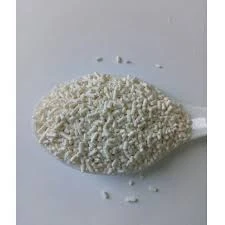
e282 preservative
Understanding E282 Preservative Safety, Uses, and Impacts
In today’s fast-paced world, food preservation has become essential for ensuring the longevity and safety of food products. One of the chemical preservatives that play a significant role in this domain is E282, also known as calcium propionate. It is widely utilized in the food industry, particularly in baked goods, to prevent mold growth and prolong shelf life. But what exactly is E282, and what are its implications for our health and the environment?
What is E282?
E282 is the E-number assigned to calcium propionate, which is a calcium salt of propionic acid. As a food additive, it functions primarily as a preservative and is recognized for its antimicrobial properties. It effectively inhibits the growth of fungi and bacteria, making it a popular choice for products such as bread, pastries, and other bakery items. The compound is generally regarded as safe and is approved for use by major food safety authorities, including the European Food Safety Authority (EFSA) and the U.S. Food and Drug Administration (FDA).
Uses of E282 in Food
The primary application of E282 is in the baking industry, where it helps extend the shelf life of bread and other products by preventing spoilage and mold growth. Its inclusion in the production process ensures that consumers can enjoy fresher products for longer periods. Additionally, calcium propionate is also used in other food items, such as processed cheese and various dairy products, to combat mold.
Furthermore, in the agricultural sector, E282 is utilized as a feed preservative for livestock. It helps control the fermentation process in silage, improving the quality of feed and supporting animal health.
e282 preservative

Safety and Health Implications
While E282 is considered safe for consumption, some consumers express concerns regarding chemical additives in their food. Scientific research indicates that calcium propionate is generally non-toxic, and human studies have not shown any significant adverse effects when consumed in moderate amounts. Nevertheless, overconsumption of any food additive may lead to potential reactions, and some individuals might be sensitive to specific compounds.
There has been some discussion regarding the potential effects of E282 on behavior and health, particularly in children. However, the bulk of scientific evidence does not support a clear correlation between E282 intake and negative health outcomes.
Environmental Considerations
The production and use of preservatives like E282 also raise environmental questions. The synthetic production process can result in emissions and waste, contributing to environmental degradation if not managed correctly. However, the preservation benefits lead to reduced food waste, which is a critical factor in sustainability efforts.
Conclusion
E282 or calcium propionate is an essential food additive that helps maintain the quality and safety of baked goods and various other food products. While generally regarded as safe, it is essential for consumers to stay informed about what they eat and make choices that align with their health and environmental values. As food preservation technology evolves, ongoing research will continue to shed light on the safety and efficacy of additives like E282, ensuring that they meet both consumer expectations and health standards.
-
Pure Sodium Dichloroisocyanurate Dihydrate | Powerful DisinfectantNewsAug.29,2025
-
Industrial Chemicals: Quality & Purity for Every IndustryNewsAug.28,2025
-
Nitrile Rubber Honoring Strict Production StandardsNewsAug.22,2025
-
Aspartame Ingredients Honoring Food Safety ValuesNewsAug.22,2025
-
Fertilizer for Balanced Plant NutritionNewsAug.22,2025
-
Cyanide Gold Processing with High Purity AdditivesNewsAug.22,2025
-
Formic Acid in Textile Dyeing ApplicationsNewsAug.22,2025
Hebei Tenger Chemical Technology Co., Ltd. focuses on the chemical industry and is committed to the export service of chemical raw materials.
-

view more DiethanolisopropanolamineIn the ever-growing field of chemical solutions, diethanolisopropanolamine (DEIPA) stands out as a versatile and important compound. Due to its unique chemical structure and properties, DEIPA is of interest to various industries including construction, personal care, and agriculture. -

view more TriisopropanolamineTriisopropanolamine (TIPA) alkanol amine substance, is a kind of alcohol amine compound with amino and alcohol hydroxyl, and because of its molecules contains both amino and hydroxyl. -

view more Tetramethyl Thiuram DisulfideTetramethyl thiuram disulfide, also known as TMTD, is a white to light-yellow powder with a distinct sulfur-like odor. It is soluble in organic solvents such as benzene, acetone, and ethyl acetate, making it highly versatile for use in different formulations. TMTD is known for its excellent vulcanization acceleration properties, which makes it a key ingredient in the production of rubber products. Additionally, it acts as an effective fungicide and bactericide, making it valuable in agricultural applications. Its high purity and stability ensure consistent performance, making it a preferred choice for manufacturers across various industries.





